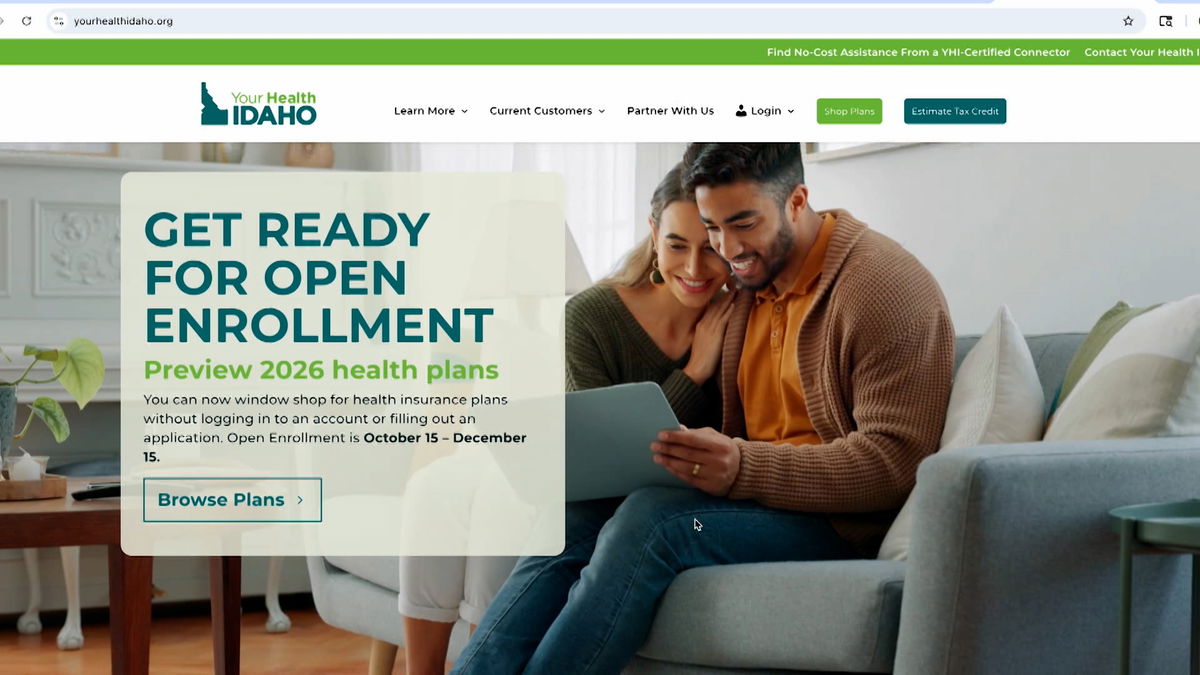Your Health Idaho’s Open Enrollment begins: Insurance premiums set to double for 117,000 as tax credits near expiration

News Team
IDAHO (KIFI) — Idaho is the first state in the nation to open its Affordable Care Act (ACA) health insurance marketplace enrollment starting October 15. But the opening is marked by uncertainty due to the potential expiration of Biden-era health insurance tax credits. If Congress does not act before the end of the year, an estimated 117,000 Idahoans who use marketplace plans could see their insurance premiums more than doubled, according to independent researchers.
RELATED: Idaho Insurance Broker weighs in on potential health insurance premium spikes
The high-stakes enrollment period, running from October 15 to December 15 through the state’s online marketplace, Your Health Idaho, comes as an ongoing federal government shutdown approaches two weeks, with the extension of the popular tax credits remaining a major political sticking point in Washington. Researchers with the nonpartisan Kaiser Family Foundation estimate that up to 25,000 Idahoans could lose coverage entirely if the tax credits expire.
“Shop and Compare” is critical
Your Health Idaho remains the only place where Idahoans can apply for and receive a tax credit to lower the cost of monthly health insurance premiums.
“There are many changes this year, and it’s more important than ever for Idahoans to shop and compare to explore all of their health insurance options,” said Pat Kelly, Executive Director of Your Health Idaho. “Having health insurance is not only for the peace of mind that you and your family are covered if the unexpected happens, but it can also provide a financial safety net from unplanned medical bills.”
While Idahoans may see higher initial premium figures due to the end of the enhanced Premium Tax Credits and other federal policy changes, the organization says it is committed to offering comprehensive options. Almost eight out of every ten current enrollees currently receive a tax credit, and many also qualify for additional savings through Cost-Sharing Reductions (CSRs) when enrolled in a Silver plan, according to Your Health Idaho.
Political showdown over healthcare costs
The potential rise in health insurance premiums has created a heated debate along both sides of the political aisle.
Idaho Democratic Party Chair Lauren Necochea denounced the potential end of the tax credits, framing the price hikes as a manufactured crisis.
“Families across the state are opening letters that tell them their premiums are doubling, and many are realizing they will have to give up coverage altogether,” Necochea wrote in a statement. “This is no accident. The Trump regime and Idaho Republicans refused to extend the Affordable Care Act tax credits that have kept coverage within reach for 117,000 Idahoans.”
Necochea asserted that Democrats are committed to fighting the cost increases. “Idaho families cannot afford this manufactured crisis, and Democrats will not stop fighting until every Idahoan can access affordable health care.”
An independent poll by KFF found that nearly 75% of Americans want the ACA tax credits to be extended, including a majority of Republicans.
How to enroll
Amid the uncertainty, Your Health Idaho highly recommends that citizens work with a certified agent or broker to navigate the complex enrollment process and utilize all the savings for which they are eligible; this assistance is available at no cost. New this year, Idahoans can schedule an appointment with a local agent directly from the website, YourHealthIdaho.org.
Open Enrollment is also the time when Idahoans with unaffordable employer-sponsored coverage can utilize the marketplace. The site has provided an affordability calculator to help people in the Gem State determine if their current coverage meets the federal definition of unaffordable, which may qualify them for marketplace subsidies. For more information, click HERE.
Idahoans must enroll in 2026 health insurance by midnight on December 15. Your Health Idaho is urging applicants not to wait until the last minute to secure coverage that begins on January 1.